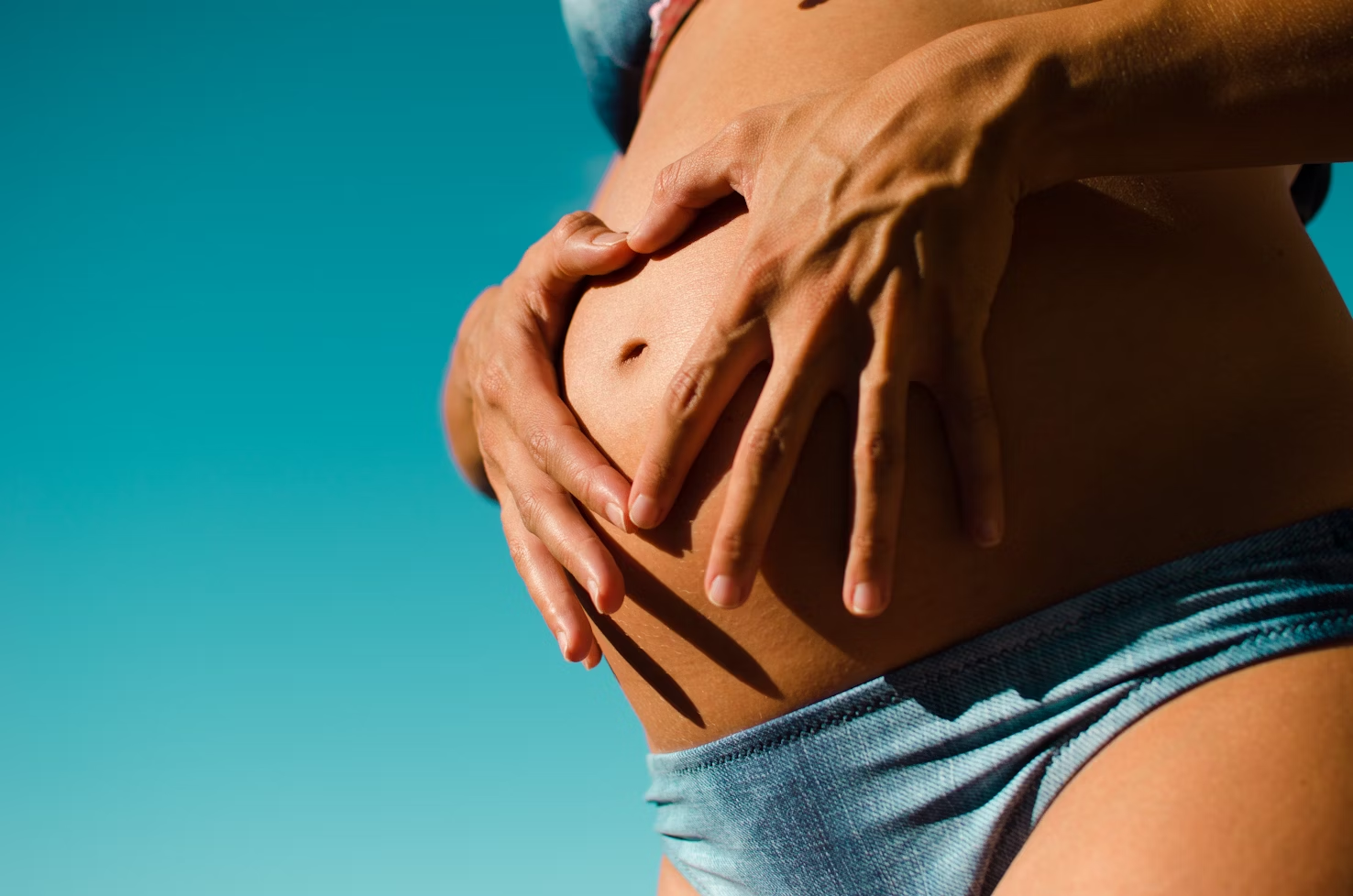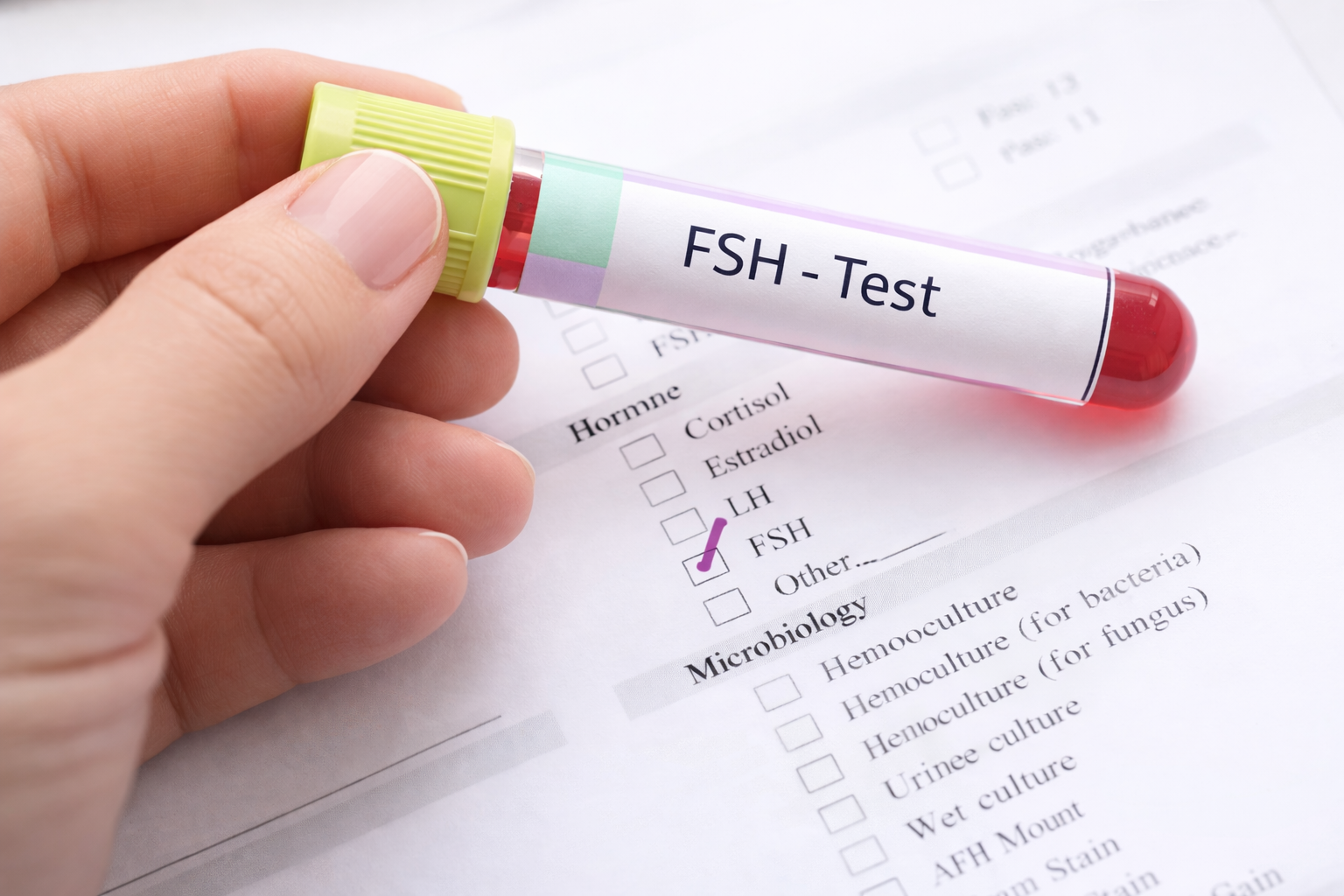Contrary to popular belief, you actually can get pregnant during perimenopause. In this article, we’ll tell you why that is, plus everything you need to know in order to get pregnant or avoid perimenopause pregnancy.

Contrary to popular belief, you actually can get pregnant during perimenopause. In this article, we’ll tell you why that is, plus everything you need to know in order to get pregnant or avoid perimenopause pregnancy.
Think perimenopause means you can’t get pregnant? Think again!
In reality, pregnancy during perimenopause isn’t only possible, it’s increasingly common. With more people shifting parenthood to later in life, birth rates among US women aged 40 and over have steadily increased over the past three decades.
How is pregnancy during perimenopause possible? We’ll tell you. Read on for evidence-based answers to all your perimenopause pregnancy questions, including why perimenopause doesn’t mean the end of fertility, how to tell pregnancy symptoms from perimenopause symptoms, and what you need to know in order to conceive (or avoid pregnancy) during perimenopause.
Can you get pregnant during perimenopause?
Let’s dispel the myth surrounding perimenopause and pregnancy. Can you get pregnant during perimenopause? Yes, absolutely!
Perimenopause isn’t the end of fertility – it’s the decline of fertility. This distinction is absolutely crucial for pregnancy.
During perimenopause, you undergo the biological shift that will eventually take you over the menopause threshold and out of your reproductive years. After menopause (more on that below), pregnancy is impossible.
In perimenopause, however, you’re not there yet. Your fertility is declining, but it isn’t over, which means perimenopause pregnancy is 100% possible. The chances of conceiving each cycle do tend to be lower, though, and getting pregnant may take longer or call for extra fertility support.
Fertility during perimenopause: Pregnancy from ages 40 to 50+
Generally, perimenopause starts sometime in a person’s late 30s to early-to-mid 40s. According to the most recent CDC data, pregnancy rates also begin evolving around these ages. Rates tend to decrease in the late 30s and early 40s, down from earlier peak reproductive years.
Still, people do become pregnant later in life. As the March of Dimes reports, 3.9% of all people who gave birth in the US from 2021 to 2023 were aged 40 and over.
What are the chances of conceiving during perimenopause?
While fertility depends partly on age (among other factors), your 20s and 30s certainly aren’t the only years when you can get pregnant.
Let’s take a look at perimenopause fertility at different ages:
Perimenopause fertility in your early 40s
In your early 40s, you have a 10% chance of conceiving in a given cycle. Put differently, for every ten people trying to conceive, one will get pregnant that cycle and the other nine will have to try again the next cycle.
Perimenopause fertility in your mid-to-late 40s
Beyond the age of 45, the chances of conceiving naturally are extremely low. Fertility has declined significantly by this point in perimenopause, and you’re likely to run into major infertility issues.
Still, it’s important to define our terms here. Conceiving “naturally” means that you and your partner conceive through sex only. This is different from conceiving with fertility support, which is when you conceive with medical help like an assisted reproductive technology (ART) procedure.
So while conceiving naturally is unlikely in your mid-to-late 40s, the chances aren’t zero. Plus, pregnancy through assisted conception is still possible.
Perimenopause fertility in your 50s
Conceiving in your 50s is highly unlikely. By this time, it’s far more likely that you’re almost done with perimenopause and nearly past menopause, which marks the end of your fertility. In fact, 51 is the average age of menopause.
The science behind perimenopause fertility
Why are you still fertile in perimenopause, and what makes pregnancy during perimenopause possible? The answer has to do with your hormones, menstrual cycle, and ovulation.
What happens to hormones during perimenopause?
Perimenopause is driven by major shifts in levels of key reproductive hormones like estrogen, progesterone, and luteinizing hormone (LH).
These hormones are also essential for supporting your cycle and reproductive capacity:
- Estrogen regulates ovulation, the moment in your cycle when your ovaries release a mature egg (which can be fertilized by sperm).
- LH triggers ovulation.
- Progesterone thickens the uterine lining (endometrium) for a fertilized egg to implant, and supports the early stages of pregnancy.
As perimenopause progresses, estrogen and progesterone decrease while LH increases (although hormones fluctuate unpredictably as they shift).
All of this change disrupts your hormone balance, making it more difficult for hormones to work in tandem to regulate your cycle. This in turn causes the slow decline in fertility that you experience during perimenopause.
But remember: fertility decline isn’t the same as the end of fertility. The key difference between the two is whether you’re ovulating, and continuing to ovulate is also what makes perimenopause pregnancy possible.
How does perimenopause impact ovulation?
You’re born with a finite number of eggs, known as your ovarian reserve, which gets progressively smaller as you get older.
By the time you’re in perimenopause, you’re nearing the end of your ovarian reserve. The remaining eggs also tend to be of lower quality, and may have issues like chromosomal abnormalities. None of this means that there’s something wrong with you, it’s just a normal part of aging with ovaries.
Together, perimenopause hormone changes and your lowered ovarian reserve make ovulation increasingly irregular and unpredictable. As perimenopause progresses, it’s common to experience cycles where you don’t ovulate at all (anovulatory cycle). You can’t get pregnant in an anovulatory cycle.
Still, irregular ovulation is different from no ovulation. Every time the ovaries release an egg, pregnancy is possible. So as long as you continue ovulating in perimenopause, no matter how irregularly, you can become pregnant.
How does perimenopause impact periods?
As you may already know, perimenopause also makes your periods irregular. But irregular periods don’t equal infertility! Yes, irregular periods can make conceiving a bit harder since tracking your cycle becomes harder, but you can still get pregnant.
It all comes back to ovulation: as long as you’re still ovulating during perimenopause, a perimenopause pregnancy is possible – regardless of how irregular your periods are.
This changes, of course, once you reach official menopause and your periods end.
When do you reach menopause? The 12-month menopause rule
Menopause is your final period.
How do you know whether you’ve had your final period? You have to wait and see using the 12-month menopause rule. Once you’ve gone 12 consecutive months without a period, it means that your final period came and went, you’ve officially passed the menopause threshold, and you’re now in post-menopause.
In other words, menopause is a waiting game. If you get another period, even if it’s been ages since the previous one, the 12-month clock restarts. At this point, you’re still in perimenopause and you can still get pregnant. Beyond menopause, however, pregnancy is no longer possible.
Pregnancy symptoms vs. perimenopause symptoms
Certain symptoms of pregnancy overlap with perimenopause symptoms, which can sometimes make it hard to distinguish between pregnancy and perimenopause.
These symptoms, for example, can occur with both pregnancy and perimenopause:
- Missed periods
- Fatigue
- Mood swings
- Weight changes
- Breast tenderness
Luckily, there are also key differentiating factors to help you determine whether you’re pregnant during perimenopause or just in perimenopause.
Symptoms that tend to point to a perimenopause pregnancy include:
- Nausea and vomiting
- Food cravings
- A sustained increase in progesterone (progesterone rises to support a growing pregnancy)
Symptoms that likely indicate perimenopause only include:
- Hot flashes
- Night sweats
- Vaginal dryness
- Fluctuations and decreases in progesterone
If you’re having overlapping pregnancy and perimenopause symptoms, you may be wondering when to take a pregnancy test. For the most accurate results, wait at least a week after the date of your missed period, then test. Testing too soon could give you inaccurate results.
What to know if you’re trying to conceive during perimenopause
If you’re trying to conceive during perimenopause, tracking your cycle is essential for managing irregular periods and irregular ovulation. Perimenopause fertility kits are a great cycle tracking tool.
The Oova kit, for example, measures key fertility hormones to accurately capture the patterns indicating your cycle phases. This way, you can pinpoint ovulation (no matter how irregular), time sex correctly, and maximize your chances of conceiving in a given cycle.
It’s important to be aware that pregnancy during perimenopause comes with factors to be more cautious about. The risk of preeclampsia, for instance, is higher after age 40.
This doesn’t mean that perimenopause pregnancy is unsafe. You just may need to take additional precautions to manage the risk of complications, like doubling down on prenatal care, or having more frequent doctor’s appointments.
How long will it take to conceive?
This 2017 study provides insight into possible times to conception without ART procedures, depending on your age:
- 34 to 36 years old: 56% chance of conceiving within six months, and 74% chance within one year
- 37 to 39 years old: 46% chance within six months, and 67% chance within one year
- 40 to 45 years old: 28% chance within six months, and 56% chance within one year
When looking at statistics, remember that everyone is different. The way that your unique body changes with age can vary: your decline in fertility during perimenopause could be more like a gradual descent than a steep drop-off, or vice versa.
When to seek help to conceive during perimenopause
It’s common to need some extra fertility support to conceive during perimenopause.
If you’re:
- 35 to 40 years old: Consult a fertility specialist after 6 months of trying to conceive.
- 40 years or older: Consult a specialist before getting started. A fertility consultation early on can help you prepare for the support you may need for your perimenopause pregnancy.
Together, you and your fertility care team can determine the best fertility treatment for your path to parenthood. Treatments include:
- Ovarian stimulation
- Intrauterine insemination (IUI)
- In vitro fertilization (IVF)
- IVF with intracytoplasmic sperm injection (ICSI)
What to know if you want to avoid pregnancy during perimenopause
It’s a common misconception that birth control isn’t necessary in perimenopause. In reality, you need birth control to avoid pregnancy during perimenopause. Remember: perimenopause pregnancy is possible as long as you continue ovulating.
The best contraceptive options for perimenopause are hormonal and non-hormonal forms of birth control, including:
- Pill
- Intrauterine device (IUD)
- Implant
- Shot
- Patch
- Ring
- Condoms
- Diaphragms
- Spermicide
Certain hormonal contraceptives and hormonal IUDs may also help you manage perimenopause symptoms on top of preventing pregnancy.
Other forms of birth control should be avoided during perimenopause, including natural family planning methods like the rhythm method (calendar method), BBT monitoring, and cervical secretion monitoring.
Why? Because as perimenopause makes your cycle increasingly irregular and certain perimenopause symptoms mask signs of ovulation, it becomes more difficult to use these methods properly. This, in turn, increases the risk of accidental pregnancy.
For more reliable protection, stick to hormonal or barrier contraceptives, instead.
The Bottom Line
You absolutely can get pregnant during perimenopause. Perimenopause means declining fertility, not zero fertility. Whether you're hoping to conceive or prevent pregnancy, this distinction is crucial for your reproductive health decisions. If you're trying to conceive, don't wait to seek fertility support and consider tracking your cycles, especially if you're over 40. If you want to avoid pregnancy, reliable birth control remains essential throughout perimenopause, skip natural methods and stick with proven hormonal or barrier contraceptives. Since pregnancy and perimenopause symptoms often overlap, don't hesitate to take a pregnancy test when in doubt.
Your reproductive story doesn't end with perimenopause, it simply enters a new chapter where being informed and proactive makes all the difference in confidently managing your fertility during this transitional time.
FAQs
Can you get pregnant during perimenopause?
Yes, you can still get pregnant during perimenopause since ovulation may occur irregularly until menopause is complete (12 consecutive months without a period). Women should continue using contraception during perimenopause if they wish to avoid pregnancy.
How long can you get pregnant during perimenopause?
As long as a person is ovulating, even if ovulation is irregular, that person can get pregnant during perimenopause. Exactly how long this means for you depends on your unique situation, and is influenced by factors like your hormones and lifestyle. By your late 40s and early 50s, pregnancy is unlikely.
Is it dangerous to get pregnant during perimenopause?
While pregnancy during perimenopause carries higher risks including increased chances of miscarriage, chromosomal abnormalities, and pregnancy complications like gestational diabetes, many women can have healthy pregnancies with proper prenatal care. It's essential to consult with a healthcare provider early to monitor and manage potential risks throughout the pregnancy.
What are the risks of pregnancy after 45?
Later-in-life pregnancies are associated with certain risks. Those pregnant after 45 may be more likely to experience:
- Gestational diabetes
- High blood pressure
- Preeclampsia
- Pre-term labor
- Chromosomal abnormalities
- Miscarriage
Can perimenopause symptoms mask pregnancy?
Perimenopause and pregnancy share certain symptoms, which can sometimes make it hard to know whether you’re pregnant or in perimenopause. Perimenopause symptoms that can mask pregnancy include missed periods, fatigue, mood swings, and breast tenderness.
When in doubt, take a pregnancy test a couple weeks after a missed period.
About the author

Sources
- ACOG. (2025). Having a Baby After Age 35: How Aging Affects Fertility and Pregnancy.
- ASRM. (2012). Age and Fertility.
- March of Dimes Peristats. (2024). Births: Data for United States.
- Osterman MJK, et al. (2025). National Vital Statistics Report, Births: Final Data for 2023.
- Wesselink AK, et al. (2017). Age and fecundability in a North American preconception cohort study.
About the Oova Blog:
Our content is developed with a commitment to high editorial standards and reliability. We prioritize referencing reputable sources and sharing where our insights come from. The Oova Blog is intended for informational purposes only and is never a substitute for professional medical advice. Always consult a healthcare provider before making any health decisions.



